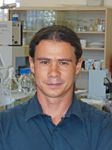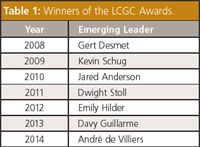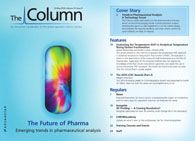The 2014 LCGC Awards (Part 2)
The 2014 Emerging Leader in Chromatography Award was presented to Andrè de Villiers. Here we chart his career and accomplishments so far.
The seventh annual LCGC Awards continue the time-honoured tradition of celebrating the careers of outstanding chromatographers. We are proud to announce that the 2014 Emerging Leader in Chromatography Award is presented to André de Villiers. This is the second of a two-part feature in The Column charting the career and accomplishments of the awardees.
LCGC's 2014 Emerging Leader in Chromatography award winner, André de Villiers, received his Bachelor of Science degree in chemistry and biochemistry (1997), his Honours Bachelor of Science degree in chemistry (cum laude, 1998), his Masters of Science degree in analytical chemistry (cum laude, 2000), and his doctoral degree in analytical chemistry (2004) from Stellenbosch University in South Africa. De Villiers says his interest in analytical science began with the start of his postgraduate studies. In 1999 he was very unsure of his future plans, but decided to meet with two professors, Henk Lauer and Pat Sandra. At that meeting, de Villiers decided to pursue analytical chemistry. "Looking back now, it seems a highly fortuitous conglomeration of circumstances that made this possible," said de Villiers. "Essentially, my career path was determined by a 30-minute discussion with Pat Sandra and Henk Lauer."

Photo Credit: Science Photo Library - MEHAU KULYK/Getty Images
From the point of view of Lauer, who is currently the managing director of HLCE and was one of de Villiers's supervisors of his masters and PhD theses, the timing of de Villiers's decision was perfect, given the changes that were going on at Stellenbosch University at the time. Ben Burger, a professor and the director of the Laboratory for Ecological Chemistry (LECUS), had decided that Stellenbosch University needed a chemistry department with a focus on separation science, so he enlisted Pat Sandra, who was then at the University of Ghent and also a director of his own Research Institute of Chromatography (RIC), to set up such a department. According to Lauer, Sandra made sure that a strong programme was established, and he imported a lot of instrumentation from Europe and helped secure funding for the new department. "De Villiers brought his talent at the right time and the right place," said Lauer. "He showed his talent with excellent study results, a great understanding of the analytical problems, and use of the instrumentation available then."
De Villiers did his postdoctoral studies at the Pfizer Analytical Research Centre (PARC) at Ghent University in Belgium, from 2004 to 2006. From there he decided to return to Stellenbosch University as a lecturer in chemistry, a position he held from August 2006 to July 2008. In August 2008, de Villiers was promoted to senior lecturer of chemistry, and he remained in that position until December 2012. In January 2013, he was promoted to associate professor of chemistry and continues to hold that position today.

André de Villiers
Contributions to the Field: De Villiers's research interests include fundamental studies that push the boundaries of the chemical characterization of complex mixtures using state-of-the-art techniques such as multidimensional liquid chromatography (LC) and gas chromatography (GC) combined with mass spectrometry (MS), and the application of these methods, primarily to natural product analysis. He has published 50 papers in peer-reviewed journals, and his papers have been cited 925 times — quite an accomplishment for such a young scientist!
Sandra, who is now an emeritus professor with the Research Institute for Chromatography and was de Villiers's professor and thesis supervisor at Stellenbosch, feels that de Villiers's greatest contribution to the field of separation science so far is his work developing new LC methods and techniques, including comprehensive LC×LC for the analysis of natural products, such as South African wines.

Figure 1: Pat Sandra with his former coworkers in April 2008 in Stellenbosch, South Africa. From left to right: Pat Sandra, Frédéric Lynen, Andreas Tredoux, André de Villiers, Deirdre Cabooter, and Martina Sandra.
Lauer agrees, citing "his endeavour to understand and nail down the complexity of molecules that define the colour, taste, and bitterness of South African wines with all the available separation techniques he could lay his hands on".
Tadeusz Górecki, a professor at the University of Waterloo in Ontario, Canada, said he values de Villiers's contributions to the area of multidimensional LC "from his early work with Isabelle François to his recent foray into hydrophilic interaction reversed-phase LC×LC". Górecki also mentioned that de Villiers's more theoretical work, such as his papers on kinetic optimization of LC separations, are also of high quality.

Figure 2: De Villiers at Cape Point, South Africa.
Emily Hilder, a professor of chemistry and director of the ARC Training Centre for Portable Analytical Separation Technologies at the University of Tasmania (as well as the 2012 LCGC Emerging Leader in Chromatography award winner), agreed with Górecki's thoughts on de Villiers's contributions in multidimensional LC. "His work has demonstrated how 2D LC can be applied to the analysis of very complex samples from natural products (wine, food, and so on)," said Hilder. "Such practical applications of this technology are what is needed to guide future developments."
Scientific Accolades: De Villiers has received a number of awards from the separation science community, including the 2009 Csaba Horváth Memorial Award from the International Symposium on High-Performance Liquid Phase Separations and Related Techniques (HPLC) and the 2012 Chromatographer of the Year award from the Chromatographic Society of South Africa. He has also been invited to deliver lectures at prestigious international conferences, such as HPLC and the International Symposium on Hyphenated Techniques in Chromatography.

Table 1: Winners of the LCGC Awards.
De Villiers is currently chairing the Western Cape board of the Chromatographic Society of South Africa. He was also responsible for the organization of two successful conferences that took place in Stellenbosch: the 39th National South African Chemical Institute convention in 2008 and Analitika 2010.
Future Contributions: Given what de Villiers has already accomplished in his career, we asked several of his mentors and peers where they thought his work might take him.
Sandra expects de Villiers to make contributions to the fundamental understanding of chromatographic processes, because he has a very strong theoretical background. He also thinks de Villiers will play an important role in education. "He will definitely have a great impact in the education of students in Africa on state-of-the-art analytical techniques and, more specifically, chromatography and electrophoresis combined with high-resolution mass spectrometry," said Sandra.
Górecki feels de Villiers will continue the legacy of other great South African separation scientists, like Victor Pretorius or Ben Burger. "He has already made his mark on separation science, and the trajectory from here can only be up, especially knowing de Villiers's talent and work ethic," Górecki said.
Barend (Ben) V. Burger, an emeritus professor from Stellenbosch University, thinks that de Villiers might branch into GC, even though that is not his primary area of research. "I think there is still much scope for the development of more affordable two-dimensional instrumentation," said Burger.
Frédéric Lynen, an associate professor at Ghent University, said de Villiers's research would continue in natural product analysis with the "discovery of new, thus far, biologically active compounds via the combination of high-end chromatography and the elucidation of structures of unknown natural solutes".
A Testament to De Villiers's Character: Other scientists describe de Villiers as friendly and down to earth. Hilder recalls first meeting him at an HPLC conference in 2006, and said their friendship has grown since then. "The separation science community is very supportive and there is now a good group of young people all at a similar stage in their careers," she said. "We catch up at meetings, and this makes for a great, fun support network of scientists for bouncing off ideas and sharing advice." Hilder also said that she shares a love of cricket with de Villiers.
De Villiers is indeed a big sports enthusiast — not just as a fan, according to Górecki. De Villiers regularly plays pickup football games, and is an avid biker and an aspiring surfer. "He often comes to the university in the summer with a surfboard attached to the roof of his car," said Górecki. "This earned him the nickname 'Professor Dude' among his students."
Górecki shared a story about de Villiers's participating in a grueling bike race around Cape Peninsula that is more than 100 km long and has numerous climbs and strong winds. Several years ago de Villiers crashed and injured himself rather badly, so he could not complete the race. It took several hours for an ambulance to reach him. "De Villiers declared that he would never do that race again and stopped biking entirely. After a few months, though, he registered for the next year's race and started to train again," said Górecki. "This dedication is what drives his career as well."
Lynen paraphrased one of de Villiers's favorite quotes: Something worth doing is worth doing well. "I always found this phrase very characteristic of his personality," said Lynen. He also mentioned a research problem that de Villiers worked on in 2003 to address peak distortion problems when drawing the calibration lines of organic acids in capillary electrophoresis. Lynen explained that the problem looked very strange and difficult to solve, but de Villiers was able to correctly deduce that the increasing concentrations of each organic acid calibrant were effectively lowering the pH of the migrating zone and, as a result, creating an electrodispersion phenomenon that could be fixed by adjusting the sample pH.1 "The meticulous approach with which he addressed that problem (also by studying a lot of literature on the topic) was very impressive and demonstrated the eye for detail that is characteristic of a true scientist," said Lynen.
More About the Winners
In-depth interviews with Fred E. Regnier and André de Villiers, focused on their research, challenges, and accomplishments will be published in upcoming editions of the LCGC North America newsletter, E-Separations Solutions.
Reference
1. A. de Villiers, F. Lynen, A. Crouch, and P. Sandra, Eur. Food Res. Technol. 217(6), 535–540 (2003).
Megan L'Heureux is the managing editor of LCGC North America.
E-mail: mlheureux@advanstar.com
Website: www.chromatographyonline.com
This article is from The Column. The full issue can be found here:http://images2.advanstar.com/PixelMags/lctc/digitaledition/May22-2014-uk.html#17

Detecting Hyper-Fast Chromatographic Peaks Using Ion Mobility Spectrometry
May 6th 2025Ion mobility spectrometers can detect trace compounds quickly, though they can face various issues with detecting certain peaks. University of Hannover scientists created a new system for resolving hyper-fast gas chromatography (GC) peaks.
University of Oklahoma and UC Davis Researchers Probe Lipidomic Profiles with RP-LC–HRMS/MS
May 6th 2025A joint study between the University of Oklahoma Health Sciences Center (Oklahoma City, Oklahoma) and the UC Davis West Coast Metabolomics Center (Davis, California) identified differentially regulated lipids in type 2 diabetes (T2D) and obesity through the application of reversed-phase liquid chromatography-accurate mass tandem mass spectrometry (RP-LC-accurate MS/MS).
Automated Sample Preparation (ISO 20122) for MOSH/MOAH in Seasoning Oils
May 6th 2025This work presents an Automated Sample Preparation procedure for MOSH/MOAH analysis of Seasoning Oils. We compare results from a manual epoxidation procedure compliant with DIN 16995 with results based on fully automated sample preparation (epoxidation and saponification) compliant with ISO 20122. In both cases, online clean-up via activated aluminum oxide (AlOx) are used to remove interfering n-alkanes from the MOSH fraction during the HPLC run. Automated data evaluation using a dedicated software (GERSTEL ChroMOH) is presented.

.png&w=3840&q=75)

.png&w=3840&q=75)



.png&w=3840&q=75)



.png&w=3840&q=75)









